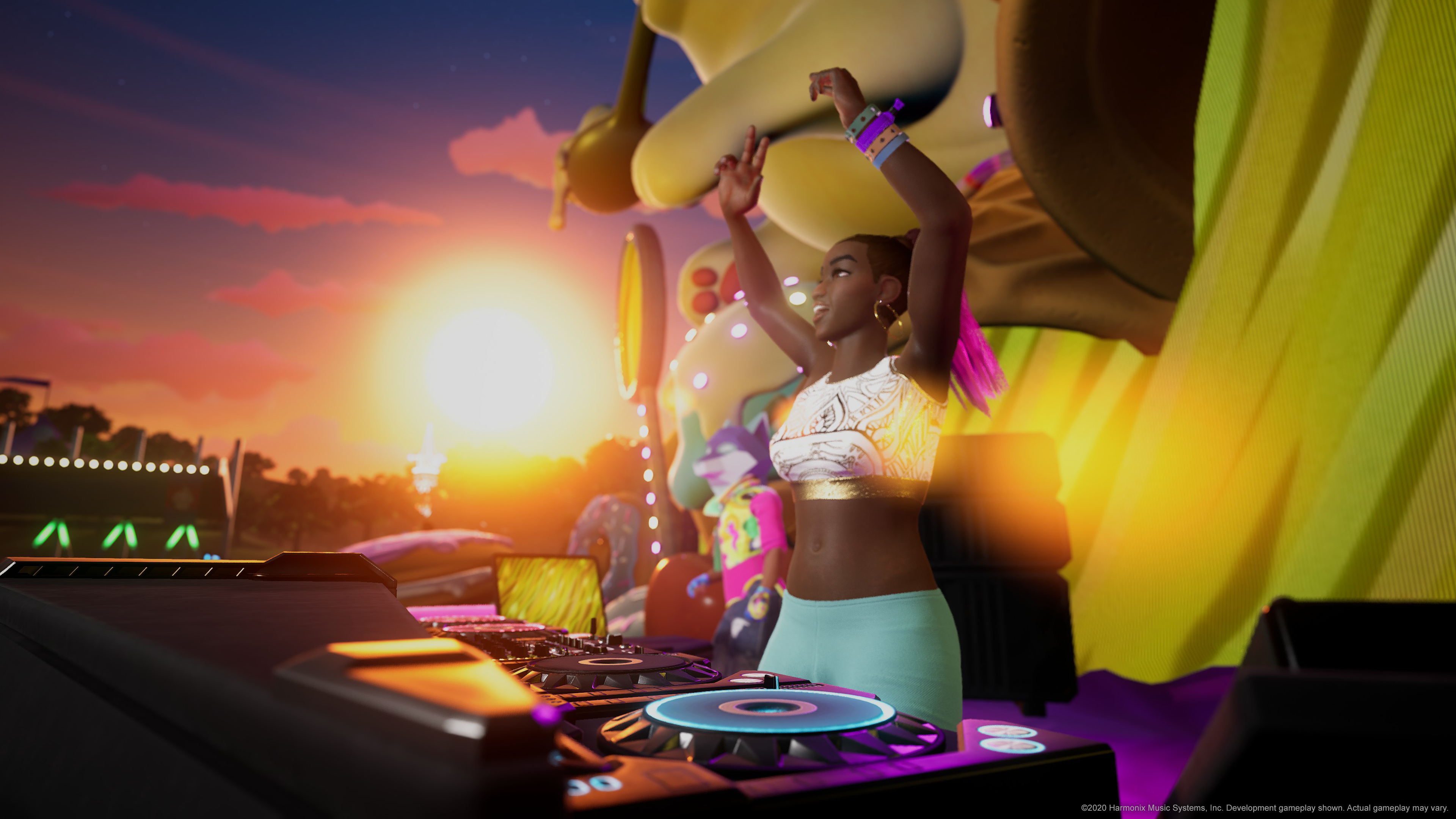
What is it? A flexible DJ simulator
Expect to pay $70 / £55
Developer Harmonix
Publisher NCSOFT
Reviewed on i5-2500K, 8GB RAM, GTX 670
Multiplayer? Yes
Out November 10
Link fuser.com
When I previewed Fuser back in June, it was the freestyle mode that I enjoyed the most. Creating an unholy fusion of Smash Mouth’s All Star to Carly Rae Jepsen’s Call Me Maybe was a highlight of my time playing, and going into the full release months later I expected to find myself again drawn in by the relaxed, inviting call of the freestyle crowd who just happen to love everything I create—even my worst abominations.
That changed when I jumped into the ten-hour campaign. After learning about pick-ups, setting the right BPM, the importance of queuing discs, creating snappy loops, and carefully constructing the perfect four disc drop, I realised there’s so much more to learn than just slapping discs down any way you like, as fun as that may be. Fuser is a music game with depth, and although it’s tempting to stay in the comfort of freestyle where the crowds will cheer for anything, the campaign mode is where you’ll find the game’s exhilarating highs.
Fuser is a DJ simulator where you’re mixing music on the fly. You select different music samples from a tracklist, drop the discs onto your deck in time with the music, and pray that your mix sounds good. Each song has four colour coded components: blue for drums, green for bass or synth, yellow for lead instruments, and red for vocals. You can choose which elements of a song you want to mix, like picking out the thrashing guitar riffs from The Clash’s Rock the Casbah, and assign it to one of the four turntables each mapped to A, S, D, and F keys.
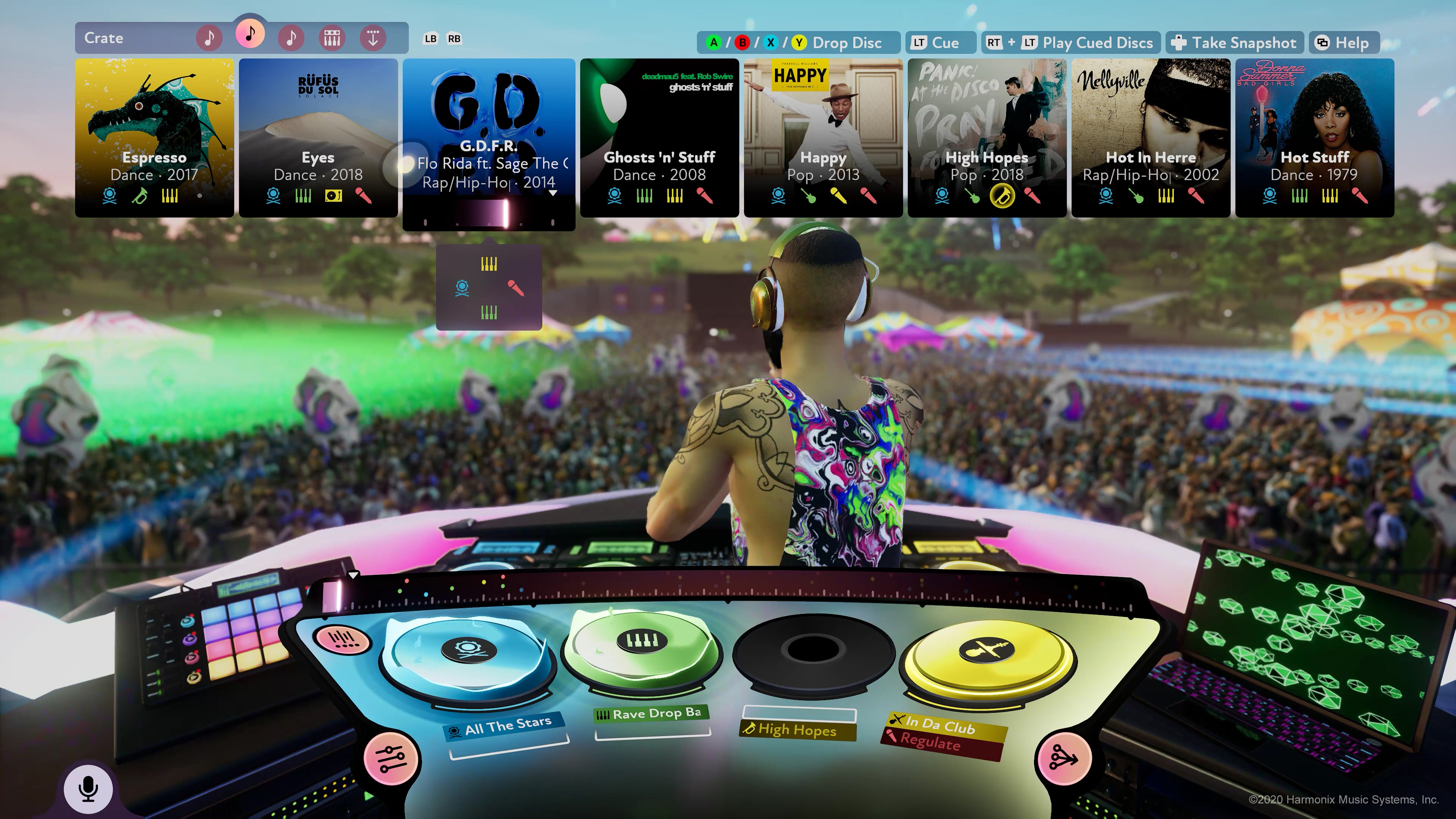
With the 100-song playlist, it may seem almost impossible to try to find a musical match, but Fuser cleverly blends each of your chosen samples together—it’s quite incredible. Harmonix’s mixing technology is just as amazing as it was in DropMix, so no matter how different your chosen song’s genre, tempo, and musical key might be, Fuser morphs each song effortlessly to match the other. Not every mix is going to be a masterpiece, and a lot of the time it sounds like your discs are making their way through a shredder, but when it works it’s harmonic euphoria.
Finding this sweet spot is what Fuser is all about, and when you stumble upon a great mix it feels amazing, and it’s this feeling that is at the heart of Fuser’s campaign. Playing as an undiscovered DJ, you need to prove your mixing skills by headlining gigs at a string of different venues. Each venue has its own eccentric music producer that specialises in a certain genre of music, and you’ll need to demonstrate your skills to them before you move on to the next venue.
Impressing these EDM giants will take more than some well-timed disc drops. Each one introduces a new skill for you to master which you can then add to your disc jockey repertoire. In some ways, the campaign acts as one long tutorial, but instead of reading endless menus, it’s streamlined into the performances. You’ll be learning new skills almost until the very end of the campaign, and I always looked forward to what new dynamic element would learn next.
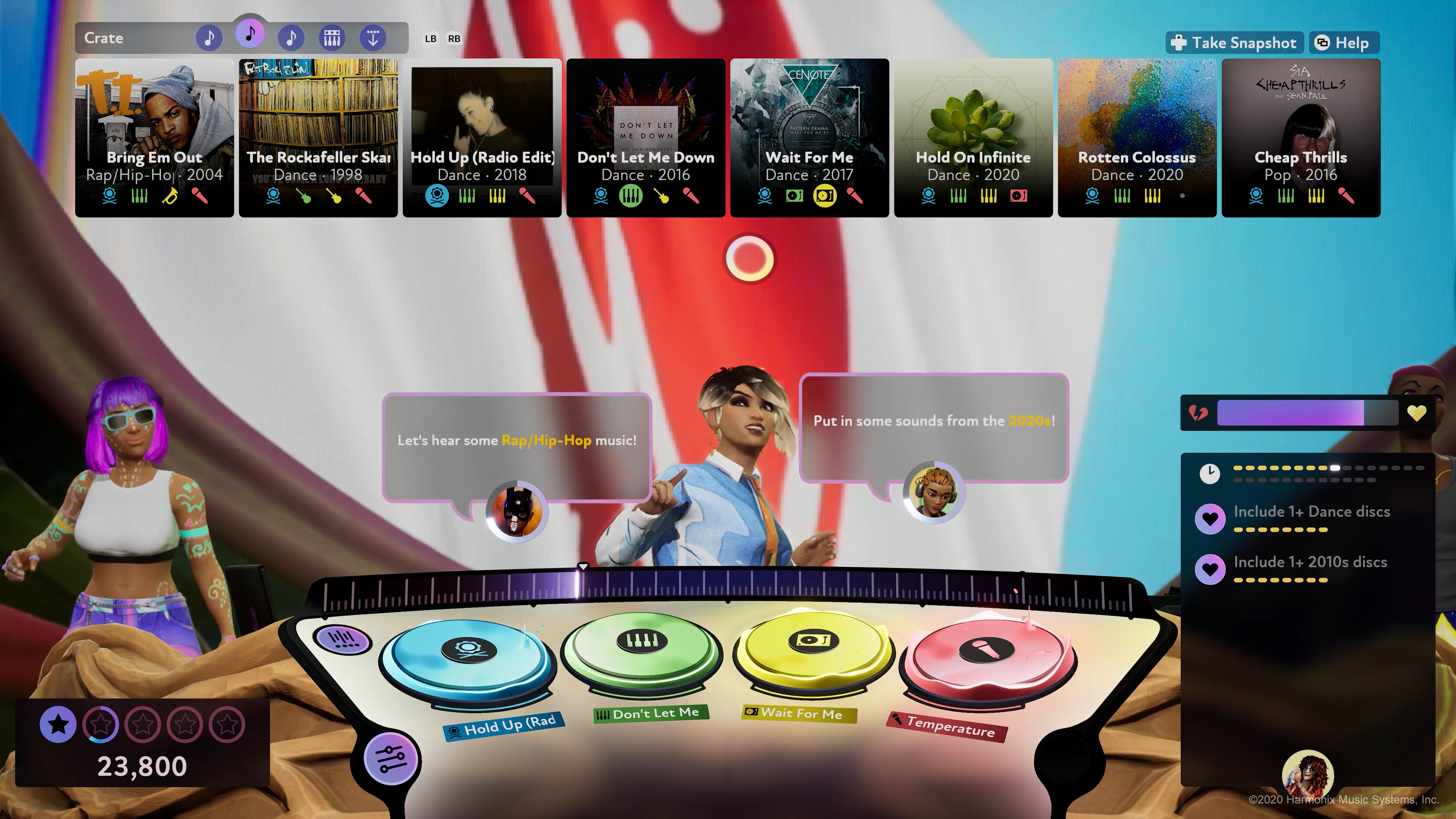
Every skill enhances your music, like dropping discs on their perfect pick-ups, creating a smooth transition from one disc to another, or (my favourite) reserving four discs and then dropping them all at the same time. There are even options like selecting the ideal key and tempo for what you’re currently playing, or completely remixing everything in an embellishing twist.
How well a concert goes depends on how many points you can score from completing timed mini-goals throughout your set. Tasks can be anywhere from fading out a disc, dropping a song from the 2000s, or creating a loop and all while keeping in time with the rhythm of the music. Audience members will also shout requests at you during a set, and completing them earn you more points towards your overall performance.
When you begin playing Fuser, it’s tempting to fire on all four cylinders at once…but Fuser encourages you to create music with more depth
It’s understandable that Fuser wants to have a point-scoring system to determine your DJ skills, but some of the tasks that the game lobs at you can put a real damper on your flow. I like the challenge of having to quickly switch up my mix as I go, and most of the time I found rising to these tasks enjoyable, like including Rick Astley into my Latin-Pop fusion. But when an audience member shouts that they specifically want the vocals from Coldplay’s Clocks for the purpose of letting me score more points, I found myself purposely missing it, wanting to stay in my groove. It’s totally counter-intuitive, but thankfully Fuser’s score counting is forgiving and with a few on-beat disc drops later you can get back on form.
It may sound like Fuser’s campaign is all solely about point-scoring, but the campaign does much more than that. When you begin playing Fuser, it’s tempting to fire on all four cylinders with four discs going simultaneously, switching discs as quickly as possible to get cheap cheers from the crowd. But Fuser encourages you to create music with more depth, and the campaign makes a point to teach you that mixing is all about peaks and valleys. Bringing a crowd down with a humble drum loop is just as important as launching them into the sky with an exhilarating EDM drop. Similarly to a rollercoaster, it’s all about creating anticipation and then landing the ultimate pay-off so when that high hits, it feels incredible.
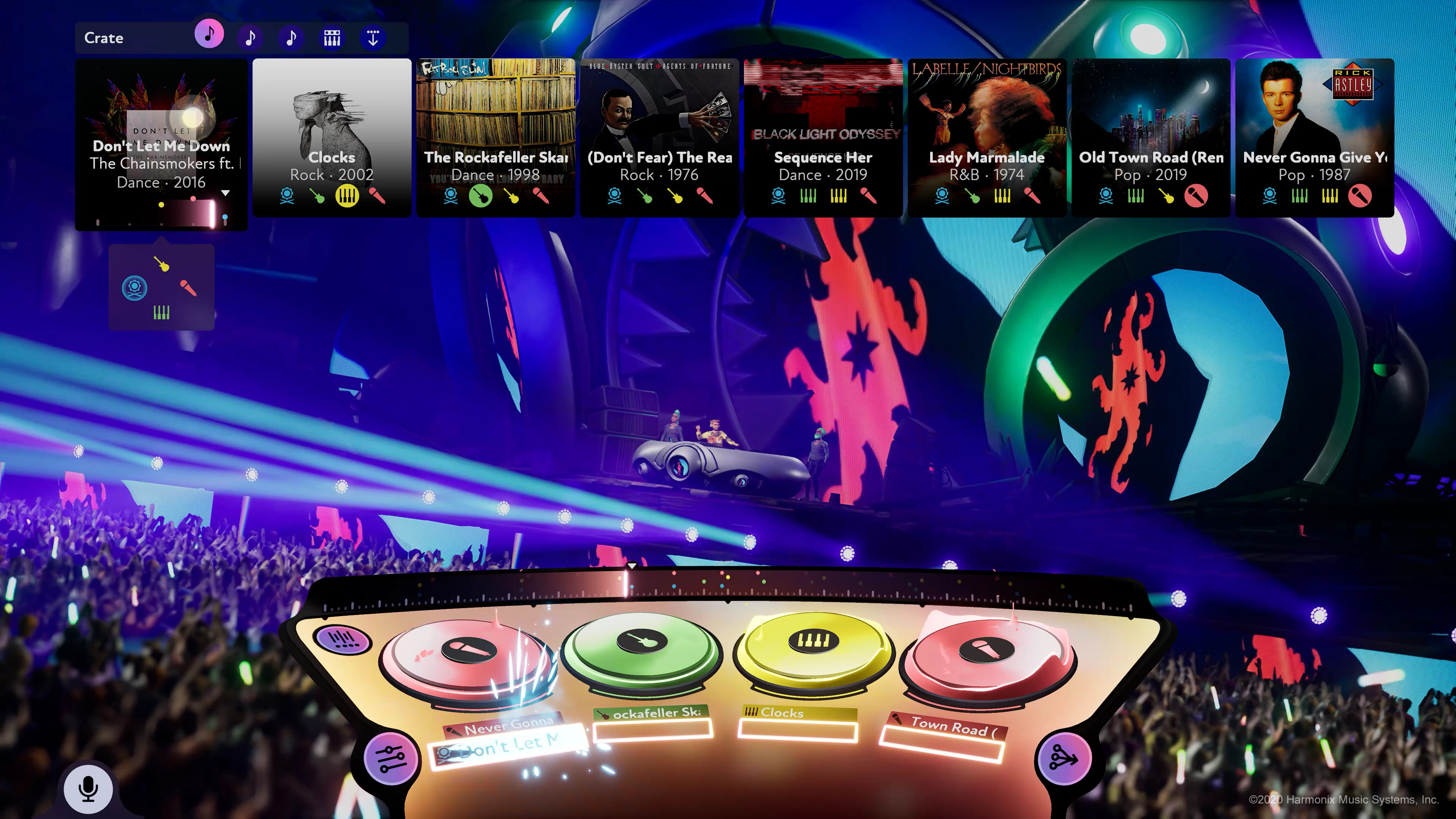

Don’t let Fuser’s focus on EDM stop you from playing. As a self-described “guy who broods to rare black metal tapes out of Australia and likes electronic music to physically hurt” Fuser has managed to melt James’ EDM-hating heart.
I personally hit my stride around set five in the third arena. Maybe it was because it was a night-time concert with a full moon and my character was wearing a wolf mask, but I finally felt the flow of Fuser. I began to make meaningful decisions in the music instead of ticking off a list of tasks thrown at me. There’s always the moment of hesitation and excitement before you drop a disc since you have no idea whether it will work or not, but those moments are fun whether you discover a new type of sound or just create audio vomit.
One feature of the deck I never quite got the hang of was looping. Much of Fuser’s mixing and effects can be manipulated on the main screen, but the looping mechanic’s menu blocks the rest of your view, demanding your full attention when you need to be keeping an eye on at least three other things. It’s by no means difficult, but when the game asks you to add a classical piano or bongo solo to your heavy EMD/Hip Hop mix, it’s an audible speed bump. If a mix is bad, however, the fast-paced nature of the music spurs you onward, meaning that a horrible mix is never lingering on your decks for too long.

The looping mechanic may be finicky, but the rest of the deck is beautifully streamlined. It’s impressive how much you can do with five keys and a mouse as an input. Everything is mapped to a comfortable position around the A through F keys, that it becomes second nature what button you need to press to get the exact effect you want. I never felt like I had to scramble around my keyboard, everything was right at my fingertips.
If Fuser’s campaign mode is a blood-pumping EDM at 150 BPM, then the game’s free play mode is a calmer rhythm of laid back R&B. It’s an endless mode, free from point-scoring or crowd demands where you can experiment as much as you like. Free play gives you the space to create interesting mixes in your own time, and you can revisit the mixes you quickly saved in the rush of campaign mode.
One aspect that Harmonix is pushing with Fuser is its multiplayer and social features. The game has its own social hub where you can share your music with the rest of the community, as well as enter your mixes into voter-based competitions. There’s also PvP battles where both players try to score points by completing requests as quickly as they can.
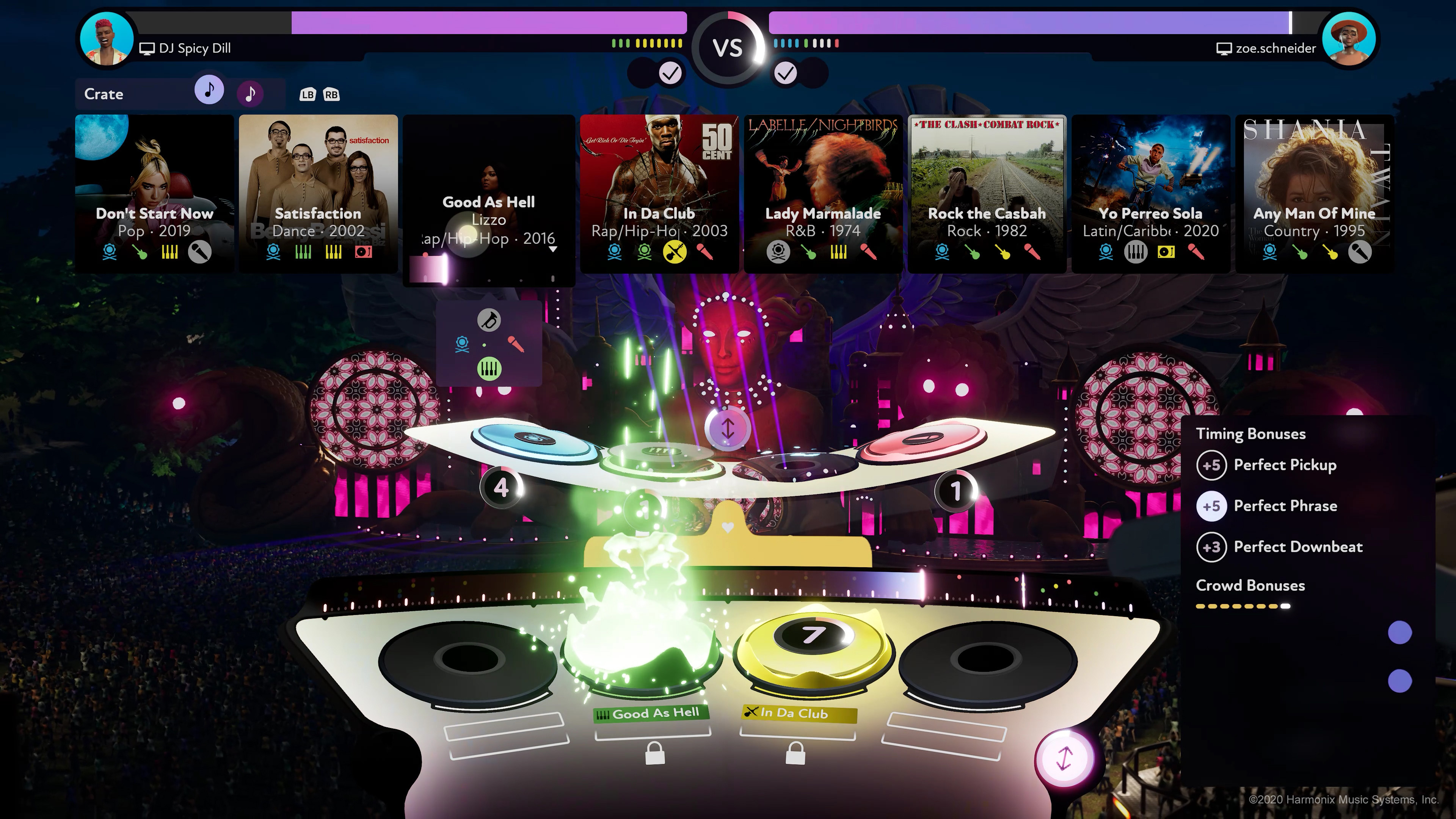
Before a battle, you need to decide what music to take with you into the fray, and I was keen to approach my disc selection as I would with choosing cards in a deck-builder. But Fuser’s battles are based on how much variety you have in your crate, meaning that you can’t really get specific with your choices. Battles are even more chaotic than the campaign and dropping discs is more frenzied and used to gain quick, cheap points rather than actually making informed musical decisions.
Fuser has a versatility that many other rhythm games lack. Your mixes might sound terrible at first but it’s about celebrating those unexpected little mistakes and using the skills you have learnt to make it work. Some of the best mixes I created in Fuser I didn’t plan at all, they just happened in the moment. When you’re in the throes of mixing and you create an absolute banger (on purpose or by accident) it’s electrifying, and after you’ve done it once you want to feel it again and again. Fuser is a rhythm game where you never stop chasing those highs.
Read our review policy
Fuser feels like a natural evolution for Harmonix and, scoring system aside, lets players take control of the music more than ever before.


